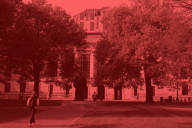You have /5 articles left.
Sign up for a free account or log in.
The essays in a new book, Academic Freedom at the Dawn of a New Century: How Terrorism, Governments, and Culture Wars Impact Free Speech (Stanford University Press), explore attacks and defenses of professors in countries all over the world. The editors (who also contribute to the volume) are Evan Gerstmann, chair of political science at Loyola Marymount University, and Matthew J. Streb, assistant professor of political science at Northern Illinois University. Streb responded to questions via e-mail on the themes of the book.
Q: How would you compare academic freedom in the United States and other countries in the post-9/11 world? Where has academic freedom been particularly respected or ignored?
A: This is a major focus of the book, as three chapters are devoted to examining academic freedom around the world. The answer is that academic freedom in the United States, while not perfect, is light years ahead of where it is in many countries. In countries such as Brazil, Ecuador, Haiti and Venezuela, some academics have been attacked because of their political positions. In countries such as Egypt, Ethiopia and Zimbabwe, academics have been imprisoned for their beliefs. These situations pale in comparison to Colombia, where hundreds of college professors and students have been killed over a 40-year period. We are dealing with completely different issues in the United States, not unimportant, but drastically different.
Q: What factors seem most associated with preserving strong academic freedom in periods of terrorism, culture wars, etc.?
A: I think that academic freedom survives in difficult periods because of a commitment to the concept by the courts, by university administrators, and by faculty. Most of the attacks on academic freedom have come from outside the university. But fortunately university officials or faculty organizations have generally not caved into the pressure of governments or organizations who want to restrict academic freedom. The fact that the courts have recognized academic freedom as a right helps as well.
Q: In the United States, how would you rate the performance of the government and of academic leaders in protecting academic freedom?
A: The record of academic leaders is better than the record of governments. As we discuss in the book, state legislatures have castigated university officials for defending academic freedom. In North Carolina, for example, the lower house of the state legislature passed a appropriations bill designed punish the University of North Carolina at Chapel Hill for assigning a book to all first-year students on the Koran. State and federal representatives have called for the ouster or certain professors who have made controversial statements. Fourteen states have mandatory loyalty oaths on the books. And, many people believe that the federal government’s passing of the USA PATRIOT Act is an assault on academic freedom. This is not to say that academic leaders have been perfect in their defense of academic freedom, but their record seems better than the records of the federal and state governments.
Q: How do you compare the issues of academic freedom today to other periods in which academic freedom was threatened in the United States?
A: Professors have more academic freedom today than they had during the height of the McCarthy era, where academics were purged because of their political beliefs -- or alleged political beliefs. Since 1957, the Supreme Court has recognized academic freedom as a constitutional right. So things are certainly better than they once were. The question is, are they good enough? And that’s what this book set out to discover.
Q: In the essays in the book, which issues raised were the most surprising to you? Which were of the greatest concern?
A: I think what surprised me the most was how grave the situation is regarding academic freedom in many countries around the world. I certainly knew that there were problems in other countries, but until you actually read about all of the examples of people being beaten, imprisoned, and even killed for their views, I don’t think you quite understand how dire the situation is.








